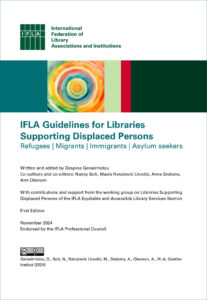Just published: IFLA Guidelines for Libraries Supporting Displaced Persons: Refugees, Migrants, Immigrants, Asylum seekers
16 December 2024
Libraries are trusted community spaces and welcoming sanctuaries for all.
The first ever IFLA Guidelines for Libraries Supporting Displaced Persons grew from a chapter inside the 2017 IFLA Guidelines for library services to people who experience homelessness published by the IFLA Equitable and Accessible Library Services Section (EALS) (formerly Library Services to People with Special Needs – LSN Section). Even at the time the need was felt that libraries are at the forefront of the refugee crisis and that they can play an active role in the lives of refugees, by providing access to relevant and necessary services and resources.
From temples to fora and from books to people, libraries are transforming themselves into being the living room of society. But how can libraries ensure that every single individual of the society can have a seat in this communal living room? Are there any ways in which the movement of knowledge can support the movement of people and the opposite? How can libraries serve the world in a world of displacement?
In this time of the largest global refugee crisis since the second world war –refugee numbers have doubled since 2016 based on the Global Refugee Forum 2023, the threat of starvation facing 343 million people in 74 countries in the world, numerous active armed conflicts, poverty, climate crisis– libraries have become more than ever a shelter for the body, mind and soul when people are making difficult decisions, chosen or forced, in order to survive. Displaced persons are scattered all over the world looking for the safest place for them and their families to settle and when they move to a new country are faced with legal, cultural, educational, and economic challenges, while in need of information, guidance and support.

Libraries play a key role in making these new community members feel welcome and succeed in their efforts to develop themselves, heal their traumas and move on. The Guidelines are more than ever needed as a go-to document for covering definitions, human rights, policies, library services and programmes, ideas for staff training, ideas on building partnerships, needs assessment, evaluation of services, suggested solutions to common challenges and to read stories on how libraries provide services to displaced persons around the world.
The Guidelines showcase how libraries can practically champion their core mission for universal and equitable access to information, ideas, and works of imagination, aiming at social, educational, cultural, democratic, and economic well-being. Download the Guidelines by clicking on the link below.
Download
IFLA Guidelines for Libraries Supporting Displaced Persons: Refugees | Migrants | Immigrants | Asylum seekers
In the face of the largest global refugee crisis since the second world war, library support to displaced persons is one of the most vital things that we as library community can provide right now. Libraries play a crucial role as trusted community spaces and welcoming sanctuaries for all, regardles...
– Maela Rakočević Uvodić, Chair, Equitable & Accessible Library Services (EALS) Section and Despina Gerasimidou, Author, IFLA Guidelines for Libraries Supporting Displaced Persons
